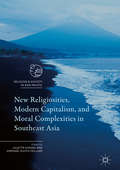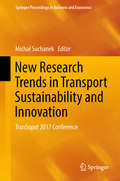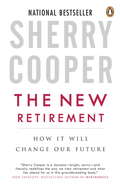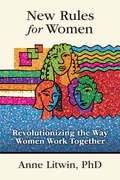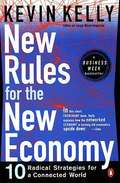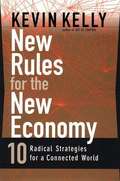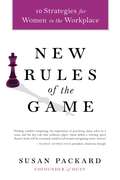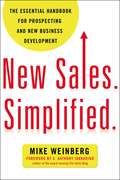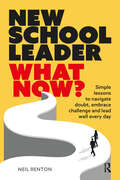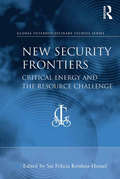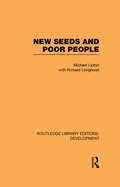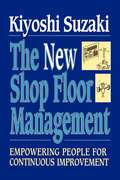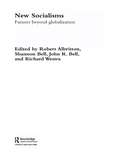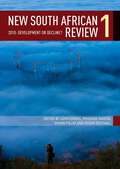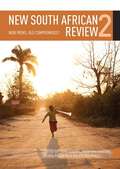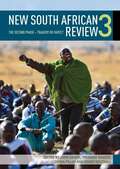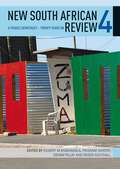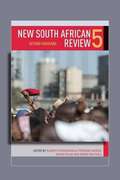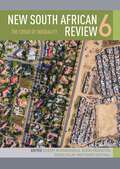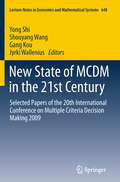- Table View
- List View
New Religiosities, Modern Capitalism, and Moral Complexities in Southeast Asia
by Juliette Koning Gwenaël Njoto-FeillardAs Southeast Asia experiences unprecedented economic modernization, religious and moral practices are being challenged as never before. From Thai casinos to Singaporean megachurches, from the practitioners of Islamic Finance in Jakarta to Pentecostal Christians in rural Cambodia, this volume discusses the moral complexities that arise when religious and economic developments converge. In the past few decades, Southeast Asia has seen growing religious pluralism and antagonisms as well as the penetration of a market economy and economic liberalism. Providing a multidisciplinary, cross-regional snapshot of a region in the midst of profound change, this text is a key read for scholars of religion, economists, NGO workers and think-tankers across the region.
New Research Trends in Transport Sustainability and Innovation: Transopot 2017 Conference (Springer Proceedings In Business And Economics)
by Michał SuchanekThis proceedings volume examines the effects of transport on socio-economic development including innovation, public health and cultural behavior. Featuring contributions presented at the 2017 TranSopot Conference in Sopot, Poland, the enclosed papers are divided to provide emerging research in transport sustainability, innovation, structure, and in municipal transport economics. Collectively, the contributions provide not only the theoretical background for transport analysis but also empirical data and practical applications. Researchers in the transport sector strive to explore the nuances of various aspects of transport economics, which are connected on many levels. The sustainability of transport fits into a wide perspective of the sustainable economy. It treats the activities of individuals, companies and local, regional and national governments as means of achieving economic and social ends. Conversely, transport sustainability has a certain burden on society as it may generate external costs in the form of congestion, pollution and negative health effects. Many of these adverse effects might be counteracted by transport innovations, both the technical ones and the organizational ones. These innovations, while their main goal might be to increase the efficiency of the transport entities, should also fit into the desirable trend of responsible economic design thinking. These general ideas of transport research naturally have to influence the research in various branches of transport ranging from the road transport to railway. Lastly, there is the municipal transport, in which goals of different stakeholders are often contradictory which leads to highly complicated decision problems. Featuring case examples on topics as bike sharing, green travel, compact cars, freight transport and electric cars, this book will be of interest to researchers, practitioners, policy makers and students in the fields of transport economics, innovation, and sustainability.
New Retirement,The
by Sherry CooperIn The New Retirement, global economic strategist Sherry Cooper explains that the boomer generation will be reaching traditional retirement age very soon and the enormous wave of boomer retirees will crest in 2025. This phenomenon will profoundly affect the labour markets, the economy, and financial markets for decades. But will boomers retire they way their parents did? Will they work longer and transition gradually into semi-retirement? Cooper tells us that boomers will redefine retirement with great energy and creativity, working well beyond age 65 and mostly by choice. With the dramatic rise in their longevity, healthy goal-driven boomers will seek purposeful leisure--focusing on regeneration, rejuvenation, and low-stress contributions to society and their own personal wealth. Follow Cooper through her own journey to discover the route to financial security in this engaging and insightful read. Learn how the new retirement is about living well while achieving both monetary security and your personal goals. The New Retirement is an indispensable roadmap to the best years of your life.
New Rich, New Poor, New Russia: Winners and Losers on the Russian Road to Capitalism
by Murray Yanowitch Bertram SilvermanNow expanded to cover the consequences of Russia's 1998 financial collapse, this book focuses on the social consequences of a modern-day great depression. The text examines the unequal distribution of the costs and benefits of Russia's leap into capitalism. The topics covered include: the emergence of the "new poor"; the recruitment of a business elite; the changing social and economic status of women; and the impact of marketization on employment. The study draws on a range of statistics and survey research data to present a portrait of the lives and circumstances of comtemporary Russians.
New Rules @ Work
by Barbara PachterFor anyone who's breaking in, moving up, or just trying to make a great professional impression, this essential guide offers real-life anecdotes and advice to help you build competence and confidence in the tricky arena of modern business etiquette. Includes: "Blunder Busters" - proven strategies to help you tackle anything from office dating to business lunches "Sir, your fly is unzipped!" - the art of verbal diplomacy Contemporary guidelines for goof-proof e-mail The top ten career killers and how to beat them Global gaffes: easy ways to avoid overseas embarrassment Grace under fire-surviving dining disasters, party faux-pas and everything in-between .
New Rules for Women: Revolutionizing the Way Women Work Together
by Anne LitwinDr. Anne Litwin's research into women's relationships and communication at work reveals startling paradoxes. In New Rules for Women, she exposes key sources of confusion and misunderstanding between women colleagues and offers powerful tools for preventing and resolving conflict that result in better relationships, as well as increased productivity and retention."This practical book--filled with tips, tools, exercises, and worksheets--has the potential to free us from negative stereotypes while helping us reclaim parts of our experience in the workplace that have been misunderstood and devalued."--Joyce K. Fletcher, Distinguished Scholar, Center for Gender in Organizations, Simmons School of Management, and author of Disappearing Acts: Gender, Power, and Relational Practice at Work"A phenomenal book for all women at all levels of any organization. It reads very easily and has practical next-step instructions. I regret that it was not available to me during my professional career in healthcare. I highly recommend it to managers and staff."--Joanne K. Carr, retired Associate Medical Center Director/Nurse Executive"With practical advice in every chapter, I see new ways to attract and retain women, value the strengths that women bring, and unleash their full potential to speed a company toward its goals. Nothing could be more important."--Deborah Rieman, Executive Chairman, Metamarkets"Anne Litwin asks brave questions about the ways in which women's unspoken assumptions about their female colleagues and bosses can undermine their overall effectiveness and performance. With fascinating research, an engaging style, and practical wisdom, this is a superb read for anyone interested in gender equity in the workplace."--Michele Tracy Berger, Associate Professor, Department of Women's and Gender Studies, University of North Carolina at Chapel Hill
New Rules for the Economy
by Kevin KellyForget supply and demand. Forget computers. The old rules are broken. Today, communication, not computation, drives change. We are rushing into a world where connectivity is everything, and where old business know-how means nothing. In this new economic order, success flows primarily from understanding networks, and networks have their own rules. In New Rules for the New Economy, Kevin Kelly presents ten fundamental principles of the connected economy that invert the traditional wisdom of the industrial world. Succinct and memorable, New Rules explains why these powerful laws are already hardwired into the new economy, and how they play out in all kinds of business--both low and high tech--all over the world. More than an overview of new economic principles, it prescribes clear and specific strategies for success in the network economy. For any worker, CEO, or middle manager, New Rules is the survival kit for the new economy.
New Rules for the New Economy: 10 Radical Strategies for Connected World
by Kevin KellyThe "new economy," posits Wired executive editor Kelly in his smart but confusing book, "has three distinguishing characteristics: It is global. It favors intangible things, ideas, information, and relationships. And it is intensely interlinked." Kelly uses this system of fluid networks to replace traditional linear models of business interrelationships. In one "rule," Kelly unexpectedly suggests that a company's goods become more valuable as their price moves closer "to free"; in another he urges companies to abandon the pursuit of proven successes. If these claims at first appear dubious, closer examination shows that they're not without credibility.
New Rules of the Game
by Susan PackardThe co-founder of HGTV shows how women can achieve their career goals using techniques of gamesmanship.New Rules of the Game provides insights, tips and direction to women in business, based on experiences from author and HGTV co-founder Susan Packard's own 30 year career, along with a dozen other prominent executives. Packard advocates for a revolutionary new perspective for businesswomen, which she calls "gamesmanship" --- a strategic way of thinking that cultivates creativity, focus, optimism, teamwork, and competitiveness. These strategies are seen in the gaming and sports worlds and often among men, but women can utilize these skills as well to learn to:compete outwardly instead of inwardlytake loss in strideprovide the emotional distance necessary to succeed at workthink tacticallystep up with more grit to get the next winlevel the playing field by understanding how male colleagues think and win at work, andadd excitement to their careers.
New Sales. Simplified.: The Essential Handbook for Prospecting and New Business Development
by Mike Weinberg S. Anthony IannarinoNo matter how much repeat business you get from loyal customers, the lifeblood of your business is a constant flow of new accounts. Whether you re a sales rep, sales manager, or a professional services executive, if you are expected to bring in new business, you need a proven formula for prospecting, developing, and closing deals. New Sales. Simplified. is the answer. You ll learn how to: Identify a strategic, finite, workable list of genuine prospects Draft a compelling, customer-focused sales story Perfect the proactive telephone call to get face-to-face with more prospects Use email, voicemail, and social media to your advantage Overcome even prevent every buyers anti-salesperson reflex Build rapport, because people buy from people they like and trust Prepare for and structure a winning sales call Stop presenting and start dialoguing with buyers Make time in your calendar for business development activities And much more Packed with examples and anecdotes, New Sales. Simplified. balances a blunt (and often funny) look at what most salespeople and executives do wrong with an easy-to-follow plan for ramping up new business starting today.
New School Leader: Simple lessons to navigate doubt, embrace challenge and lead well every day
by Neil RentonWritten for all school leaders and headteachers who are feeling daunted by their new role or need a little inspiration and encouragement in an existing role. Neil Renton answers that simple question - what now? - with guidance to help navigate feelings of self-doubt and overcome leadership challenges.It is based on the author's own experience as he tells the uplifting and incredibly honest story of his leadership journey as the new headteacher of one of the largest comprehensive schools in the North of England. Neil Renton captivates you with his story, from being appointed in late 2018, leading through a pandemic, and coping with an Ofsted inspection. It examines the kinds of challenges that new leaders face and how they can be overcome, dealing with both one-off events and the every day of school leadership.The book provides a clear focus on those first moments, months and years of being a new school leader. Its four part structure covers navigating doubt, conquering challenges, the basics of leading every day, and creating the right mindset and culture. It encourages critical reflection based on both serious and humorous stories while offering practical advice and strategies for effective educational leadership.
New Security Frontiers: Critical Energy and the Resource Challenge (Global Interdisciplinary Studies Series)
by Sai Felicia Krishna-HenselThe globalizing world is increasingly confronting a new category of security issues related to resource availability. The resource environment contains both traditional categories, such as energy, foodstuffs, and water, as well as new technologically related resources, such as rare earth minerals. The essays in this volume emphasize both the uniqueness and the magnitude of these new challenges, while simultaneously acknowledging that cooperation and competition in response to these security concerns occur within the context of both the historical and contemporary international power configurations. Moreover, these challenges are of a global nature and will require global perspectives, global thinking, and innovative global solutions. Krishna-Hensel brings together a wide range of topics focusing on critical resource availability impacting upon global security and the geopolitical ramifications of resource competition. The volume addresses the development of strategic thinking on these issues and underscores the increasing awareness that this is a critical area of concern in the twenty-first century global landscape.
New Seeds and Poor People (Routledge Library Editions: Development)
by Michael Lipton Richard LonghurstFirst published in 1989, this book deals with the impact of cereal production upon the Third World, specifically ‘Modern Varieties’ (MVs). Using evidence from plant breeding, economics and nutrition science, the authors seek to pinpoint what has been achieved, what has gone wrong and what needs to be done in future. Although the technical innovations of MVs mean more employment, cheaper food and less risk for small farmers, the reduction in crop diversity increases the risk of danger from pests and though MVs enlarge cereal stocks, many are too poor to afford them. The book concludes that technical breakthroughs alone won’t solve deep-rooted social problems and that only new policies and research priorities will increase the choices, assets and power of the rural poor.
New Shop Floor Management: Empowering People for Continuous Improvement
by Kiyoshi SuzakiIn this first comprehensive departure from the time-and-motion dictums of Frederick Taylor's Shop Management that have influenced management practices for most of this century, Kiyoshi Suzaki offers a framework for successfully conducting business at its most crucial point-the shop floor. Drawing on the principles of holistic management, where organizational boundaries are smashed and co-destiny is created, Suzaki demonstrates how modern shop floor management techniques -- focusing maximum energy on the front line -- can lead to dramatic improvements in productivity and valueadded-to-services. The role of management today, Suzaki argues, is to eliminate its own responsibilities by thinking of the organization from the genba, or shop floor, point of view. In this challenge, Suzaki claims, organizations need to collect the wisdom of people by practicing "Glass Wall Management," where organizations become transparent, enabling employees to contribute maximum creativity as opposed to blocking their potential with what he calls "Brick Wall Management." Further, to empower individuals to selfmanage their work and satisfy their customers, Suzaki asserts that they all should learn to manage their own "mini-company," where everybody is considered president of his or her area of responsibility. Front-line supervisors, Suzaki shows, must develop a mission and goals and share them both up and downstream. He cites examples of the "shop floor point of view" -- McDonald's Corporation's legal staff learning how to sell hamburgers and fix milkshake machines; Honda's human resource staff training on the assembly line -- that narrow the gap between top management and the shop floor. By upgrading people's skills, focusing on empowerment, and streamlining processes, Suzaki illustrates that an organization will realize concrete improvements in quality, cost, delivery, safety, morale, and ultimately, its competitive position.
New Social Mobility: Second Generation Pioneers in Europe (IMISCOE Research Series)
by Andreas Pott Maurice Crul Jens SchneiderThis open access book comparatively analyses intergenerational social mobility in immigrant families in Europe. It is based on qualitative in-depth research into several hundred biographies and professional trajectories of young people with an immigrant working-class background, who made it into high-prestige professions. The biographies were collected and analysed by a consortium of researchers in nine European countries from Norway to Spain. Through these analyses, the book explores the possibilities of cross-country comparisons of how trajectories are related to different institutional arrangements at the national and local level. The analysis uncovers the interaction effects between structural/institutional settings and specific individual achievements and family backgrounds, and how these individuals responsed to and navigated successfully through sector-specific pathways into high-skilled professions, such as becoming a lawyer or a teacher. By this, it also explains why these trajectories of professional success and upward mobility have been so exceptional in the second generation of working-class origins, and it tells us a lot also about exclusion mechanisms that marked the school and professional careers of children of immigrants who went to school in the 1970s to 2000s in Europe – and still do.
New Socialisms: Futures Beyond Globalization (Routledge Studies in Governance and Change in the Global Era)
by Shannon Bell John R. Bell Richard Westra Robert AlbrittonThe major problems facing the world as it gets used to the twenty-first century are global inequality, poverty, war and militarism, oppression, exploitation and ecological sustainability. Far from solving these problems, economic and political neo-liberalism seems to be plunging us deeper into them. Diverse opposition movements have arisen over the years to combat these problems, which the groups generally consider to be the result of "globalization". These opposition movements suffer greatly from being opposed to lots of things without necessarily putting forward realistic alternative suggestions. This impressive new book seeks to analyze and develop serious alternatives to the status quo. With contributions from a wide range of scholars, this important book will provide a uniquely varied outlook. Students and academics involved in international politics and economics as well as general readers with an interest in the anti-globalization movement will find this work incredibly useful.
New Songdo City
by Arthur I Segel Gerardo Garza John Richard Albert Kim Brandon Blaser Andrew M. MurphyThe government of South Korea has chosen John Hynes and Gale International to construct New Songdo City. This is an entirely new city, about the size of Boston, between the new Incheon airport and the capital of Seoul. The proposed city is the government's attempt to create an Asian financial and business center to rival Shanghai and Tokyo. But how to design, market, build, and finance a whole city is up for grabs. Is this the typical developer hubris or can it really work?
New South African Review 1: 2010: Development or decline? (New South African Review Ser.)
by Prishani Naidoo Devan Pillay Roger Southall John DanielIs South Africa on a long-term decline?The New South African Review revives the tradition of critical, analytical scholarship developed by the South African Review in the 1970s and 1980s. Accessible to a wide readership and drawing upon authors from well beyond academia, its objective is to be informative, discursive and, at times, downright provocative. It seeks to provide contemporary comment and engage with current controversies. The first volume in the series, 2010: Development or Decline? ranges widely across the implications of the international crisis for the economy, the threats to our fragile ecology of present economic strategies, through to the state of the ANC and the public service, issues around service delivery, migration, HIV-Aids, land reform, crime, the sexual behaviour of our youth, and much more. Posing the provocative question of whether South Africa is embarking upon a long-term decline, the volume simultaneously argues the potential for a society premised upon social equality, social coherence and sustainability. This collection will appeal to both national and international audiences interested in engaging with the multiple dilemmas and challenges facing contemporary South Africa
New South African Review 2: New paths, old compromises? (New South African Review Ser.)
by Carli CoetzeeAn explanation of the New Growth Plan and alternatives to neo-liberal and capitalist development in South AfricaIn this second volume of the New South African Review, the New Growth Path adopted by the South African government in 2010 provides the basis for a dialogue about whether 'decent work' is the best solution to South Africa's problems of low economic growth and high unemployment. There are investigations into rising inequality against the backdrop of the failings of Black Economic Empowerment; 'greening the economy', with emphasis on biofuels; the crisis of acid mine drainage on the Witwatersrand; possibilities for participatory forms of government; civil society activism; transformation of the print media and the SABC; the crisis in child care in public hospitals; the relationship between the police and a township community; the problems related to the absence of legislation to govern the powers of traditional authorities over land allocation; and assessments of the state of opposition political parties and the ANC Alliance. Asking whether the New Growth Plan reflects a set of new policies or an attempt to re-dress old (com)promises in new clothes, this volume brings together different voices in debate about possibilities for alternatives to neo-liberal and capitalist development in South Africa.
New South African Review 3: The second phase – Tragedy or farce? (New South African Review Ser. #3)
by Prishani Naidoo Devan Pillay Roger Southall John DanielAn evaluation of the ANC's second phase of the national democratic revolution.In the face of the continuing national tragedy of the inequality, poverty and unemployment which have triggered rising working-class discontent around the country, the ANC announced a 'second phase' of the 'national democratic revolution' to deal with the challenges. Ironically, the ANC post-Mangaung has resolved to preserve the core tenets of the minerals-energy-financial complex that defined racial capitalism - while at the same time ratcheting up the revolutionary rhetoric to keep the working class and marginalised onside. If the 'first phase' was a tragedy of the unmet expectations of the majority, is the 'second phase' likely to be a farce? The chapters in this volume are written by experts in their fields and address issues of politics, power and social class; economy, ecology and labour; public policy and social practice; and South Africa beyond its borders. They examine some of these challenges, and indicate that they are as much about the defective content of policies as their poor implementation. The third volume of the New South African Review continues the series by providing in-depth analyses of the key issues facing the country today.
New South African Review 4: A fragile democracy – Twenty years on (New South African Review Ser.)
by Kally ForrestA series of essays taking an account of the milestones of South African democracy in order to give a multidimensional perspective of South Africa. The death of Nelson Mandela on 5 December 2013 was in a sense a wake-up call for South Africans, and a time to reflect on what has been achieved since 'those magnificent days in late April 1994' (as the editors of this volume put it) 'when South Africans of all colours voted for the first time in a democratic election'. In a time of recall and reflection it is important to take account, not only of the dramatic events that grip the headlines, but also of other signposts that indicate the shape and characteristics of a society. The New South African Review looks, every year, at some of these signposts, and the essays in this fourth volume of the series again examine and analyse a broad spectrum of issues affecting the country. They tackle topics as diverse as the state of organised labour; food retailing; electricity generation; access to information; civil courage; the school system; and - looking outside the country to its place in the world - South Africa's relationships with north-east Asia, with Israel and with its neighbours in the southern African region. Taken together, these essays give a multidimensional perspective on South Africa's democracy as it turns twenty, and will be of interest to general readers while being particularly useful to students and researchers.
New South African Review 5: Beyond Marikana (New South African Review Ser.)
by Prishani Naidoo Devan Pillay Roger Southall Gilbert M KhadiagalaA series of essays explaining the impact of the events at Marikana upon the South African perspective of police and the keeping of order.This fifth volume in the New South African Review series takes as its starting point the shock wave emanating from the events at Marikana on 16 August 2012 and how it has reverberated throughout politics and society. Some of the chapters in the volume refer directly to Marikana. In others, the influence of that fateful day is pervasive if not direct. Marikana has, for instance, made us look differently at the police and at how order is imposed on society. Monique Marks and David Bruce write that the massacre 'has come to hold a central place in the analysis of policing, and broader political events since 2012...'.The chapters highlight a range of current concerns - political, economic and social. David Dickinson's chapter looks at the life of the poor in a township from within. In contrast, the chapter on foreign policy by Garth le Pere analyses South Africa's approach to international relations in the Mandela, Mbeki and Zuma eras. Anthony Turton's account, 'When gold mining ends' is a chilling forecast of an impending environmental catastrophe. Both Devan Pillay and Noor Nieftagodien focus attention on the left and, in different ways, ascribe its rise to a new politics in the wake of Marikana.The essays in NSAR 5: Beyond Marikana present a range of topics and perspectives of interest to general readers, but the book will also be a useful work of reference for students and researchers.
New South African Review 6: The Crisis of Inequality
by Gilbert M Khadiagala, Sarah Mosoetsa, Devan Pillay and Roger SouthallWide-ranging essays demonstrate how the consequences of inequality extend throughout society and the political economyDespite the transition from apartheid to democracy, South Africa is the most unequal country in the world. Its extremes of wealth and poverty undermine intensifying struggles for a better life for all. The wide-ranging essays in this sixth volume of the New South African Review demonstrate how the consequences of inequality extend throughout society and the political economy, crippling the quest for social justice, polarising the politics, skewing economic outcomes and bringing devastating environmental consequences in their wake. Contributors survey the extent and consequences of inequality across fields as diverse as education, disability, agrarian reform, nuclear geography and small towns, and tackle some of the most difficult social, political and economic issues. How has the quest for greater equality affected progressive political discourse? How has inequality reproduced itself, despite best intentions in social policy, to the detriment of the poor and the historically disadvantaged? How have shifts in mining and the financialisation of the economy reshaped the contours of inequality? How does inequality reach into the daily social life of South Africans, and shape the way in which they interact? How does the extent and shape of inequality in South Africa compare with that of other major countries of the global South which themselves are notorious for their extremes of wealth and poverty? South African extremes of inequality reflect increasing inequality globally, and The Crisis of Inequality will speak to all those general readers, policy makers, researchers and students who are demanding a more equal world.
New State of MCDM in the 21st Century
by Yong Shi Gang Kou Shouyang Wang Jyrki WalleniusThis book provides cutting-edge research results and application experiences from researchers and practitioners in multiple criteria decision making areas. It consists of three parts: MCDM Foundation and Theory, MCDM Methodology, and MCDM Applications. In Part I, it covers the historical MCDM development, the influence of MCDM on technology, society and policy, Pareto optimization, and analytical hierarchy process. In Part II, the book presents different MCDM algorithms based on techniques of robust estimating, evolutionary multiobjective optimization, Choquet integrals, and genetic search. In Part III, this book demonstrates a variety of MCDM applications, including project management, financial investment, credit risk analysis, railway transportation, online advertising, transport infrastructure, environmental pollution, chemical industry, and regional economy. The 17 papers of the book have been selected out of the 121 accepted papers at the 20th International Conference on Multiple Criteria Decision Making "New State of MCDM in 21st Century", held at Chengdu, China, in 2009. The 35 contributors of these papers stem from 10 countries.
New State of MCDM in the 21st Century: Selected Papers of the 20th International Conference on Multiple Criteria Decision Making 2009 (Lecture Notes in Economics and Mathematical Systems #648)
by Yong Shi Gang Kou Shouyang Wang Jyrki WalleniusThis book provides cutting-edge research results and application experiences from researchers and practitioners in multiple criteria decision making areas. It consists of three parts: MCDM Foundation and Theory, MCDM Methodology, and MCDM Applications. In Part I, it covers the historical MCDM development, the influence of MCDM on technology, society and policy, Pareto optimization, and analytical hierarchy process. In Part II, the book presents different MCDM algorithms based on techniques of robust estimating, evolutionary multiobjective optimization, Choquet integrals, and genetic search. In Part III, this book demonstrates a variety of MCDM applications, including project management, financial investment, credit risk analysis, railway transportation, online advertising, transport infrastructure, environmental pollution, chemical industry, and regional economy. The 17 papers of the book have been selected out of the 121 accepted papers at the 20th International Conference on Multiple Criteria Decision Making "New State of MCDM in 21st Century", held at Chengdu, China, in 2009. The 35 contributors of these papers stem from 10 countries.
